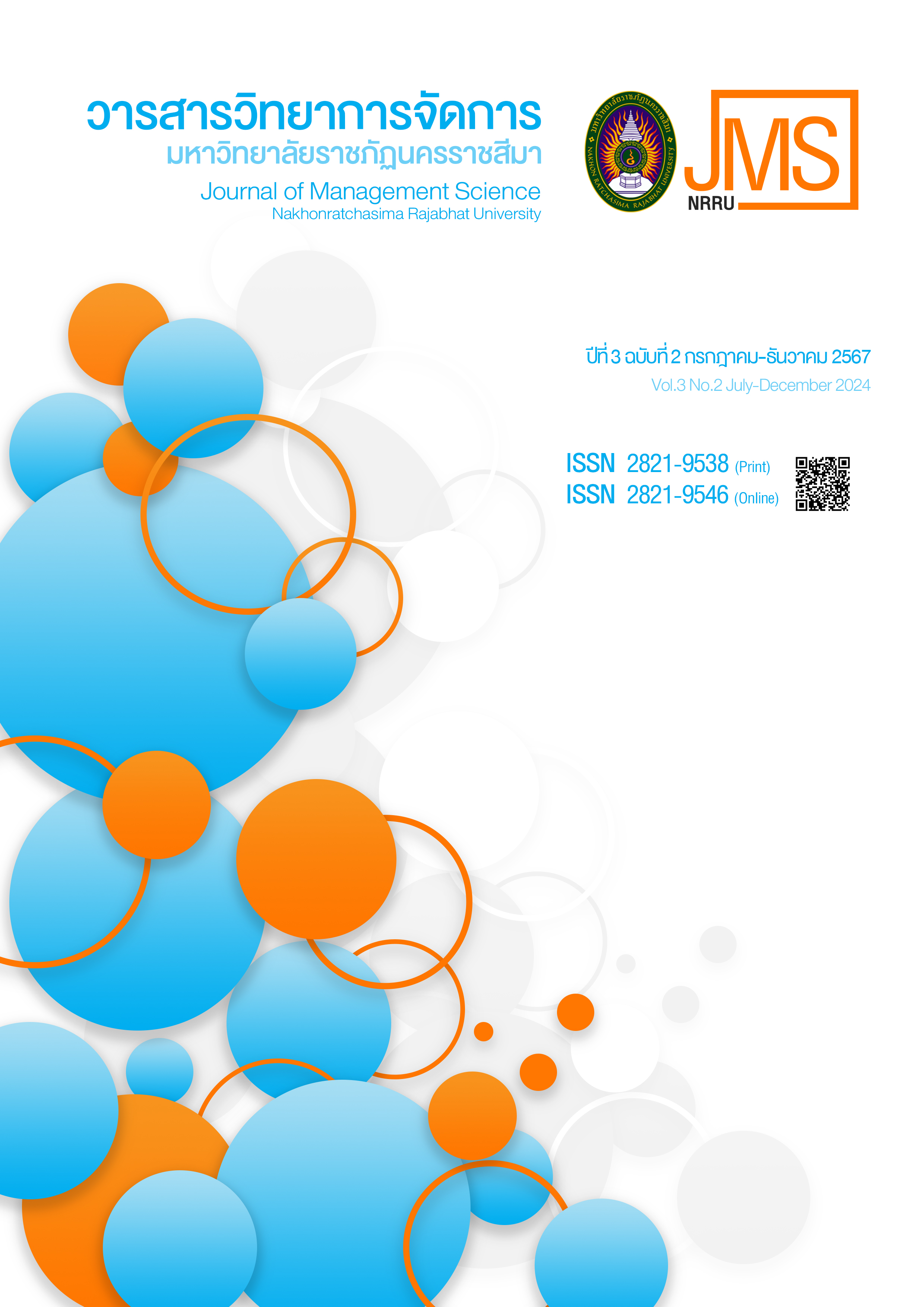Causal Relationships of Logistics Performance, Logistics Efficiency and Pottery Product Entrepreneurs’ Performance at Dan Kwian Subdistrict, Chok Chai District, Nakhon Ratchasima Province
Main Article Content
Abstract
This research was objected to study 1) the logistics performance, the logistics efficiency and the performance of pottery product entrepreneurs in Dan Kwian Subdistrict, Chok Chai District, Nakhon Ratchasima Province 2) the causal relationship among the logistics performance, the logistics efficiency and the entrepreneurs’ pottery performance. A questionnaire was used as a tool to collect data with a sample group of 315 entrepreneurs and people involved in pottery products in Dan Kwian Subdistrict, Chok Chai District, Nakhon Ratchasima Province. The descriptive statistics ; Frequency, Percentage, Mean, and Standard Deviation. In addition, the inferential statistics was used to analyze the structural equation models (SEM). and test the hypotheses. The study found that level of opinions regarding the logistics performance and the logistics efficiency was overall at a high level while the performance of the entrepreneurs was overall
at a moderate level. Moreover, the logistics performance had a direct impact on logistics efficiency while the logistics efficiency had a significant direct impact on the operating performance of the entrepreneurs at the level of 0.05. On the contrary, the logistics performance had no direct impact on the performance of entrepreneurs but there was an indirect impact
of the logistics efficiency
Article Details

This work is licensed under a Creative Commons Attribution-NonCommercial-NoDerivatives 4.0 International License.
บทความในวารสารเป็นลิขสิทธิ์ของวารสารวิทยาการจัดการ มหาวิทยาลัยราชภัฏนครราขสีมา
บทความที่ปรากฎในวารสารเป็นความคิดเห็นของผู้แต่งเพียงอย่างเดียวซึ่งไม่เกี่ยวข้องกับวารสาร
References
เกริกกล้า สนธิมาศ. ประธานสมาพันธ์โลจิสติกส์ไทย. บรรยาย. 6 พฤศจิกายน 2557
ขวัญเรือน มาลากุล ณ อยุธยา. (2562). ปัจจัยที่ส่งผลต่อประสิทธิภาพทางด้านโลจิสติกส์ของอุตสาหกรรมเครื่องดื่มในเขตกรุงเทพและปริมณฑล. วิทยานิพนธ์บริหารธุรกิจมหาบัณฑิต คณะบริหารธุรกิจ
บัณฑิตวิทยาลัย มหาวิทยาลัยรังสิต.
ณัชภัค สถิตย์ธรรม, สวียา ปรารถนาดี ชาติวิวัฒนาการ และศิริพร เลิศยิ่งยศ (2565). “สมรรถนะโลจิสติกส์ กลยุทธ์การจัดการโลจิสติกส์ และประสิทธิภาพโลจิสติกส์ที่มีต่อผลการดำเนินงานโลจิสติกส์ของอุตสาหกรรมผู้ผลิตชิ้นส่วนยานยนต์ในประเทศไทย.” วารสารปัญญาภิวัฒน์. 14(3) : 121-136.
พัฒน์ พิสิษฐเกษม. (2557). ปัจจัยที่มีผลต่อสมรรถนะทางด้านโลจิสติกส์และผลกระทบที่มีต่อผลการดำเนินงานของอุตสาหกรรมผู้ผลิตชิ้นส่วนยานยนต์ในประเทศไทย. วิทยานิพนธ์ปรัชญาดุษฎีบัณฑิต มหาวิทยาลัยรามคำแหง.
พิรุฬห์ลักษณ์ ยุวะเวช. (2563). การบริหารความเสี่ยงธุรกิจโลจิสติกส์ของผู้ประกอบการขนส่งสินค้าทางน้ำ
ในเส้นทางลำเลียงแม่น้ำเจ้าพระยาสู่น่านน้ำประเทศกัมพูชา. วิทยานิพนธ์บริหารธุรกิจมหาบัณฑิต สาขาวิชาบริหารธุรกิจ มหาวิทยาลัยราชภัฏพระนครศรีอยุธยา.
เพ็ญพร ปุกหุต. (2563). ความสำเร็จของผลการดำเนินงาน ภายใต้ทรัพยากรโลจิสติกส์ที่มีความโดดเด่นกับความสามารถของธุรกิจให้บริการโลจิสติกส์ของประเทศไทย. วิทยานิพนธ์ปรัชญาดุษฎีบัณฑิต สาขาวิชาการบริหารธุรกิจ มหาวิทยาลัยนเรศวร.
ระบิล พ้นภัย, นรรัฐ รื่นกวี และอัมพาพร ลีลามโนธรรม. (2562). การวัดประสิทธิภาพการจัดการโลจิสติกส์และ
ซัพพลายเชน : การศึกษาอุตสาหกรรมอาหารไทย. คณะบริหารธุรกิจ มหาวิทยาลัยเทคโนโลยี
ราชมงคลอีสาน.
ฤทัยภัทร ศุกระศร. (2564). การลดต้นทุนโลจิสติกส์ด้วยเทคนิคการบัญชีต้นทุนฐานกิจกรรมของ บริษัทเหมืองแร่หินปูน. วิทยานิพนธ์วิศวกรรมศาสตรมหาบัณฑิต สาขาวิชาวิศวกรรมอุตสาหการ บัณฑิตวิทยาลัย มหาวิทยาลัยเชียงใหม่.
ศูนย์ช่วยเหลือทางวิชาการพัฒนาชุมชน เขตที่ 11 นครราชสีมา. (2566). รายงานประจำปี 2566. [ออนไลน์]. แหล่งที่มา : https://training-nakhonratchasima.cdd.go.th/2024/05/07/010567-2. [1 ตุลาคม 2566]
สวัสดิ์ วรรณรัตน์. (2564). “อิทธิพลของนวัตกรรมโลจิสติกส์ต่อผลการดำเนินงานขององค์กรผู้ให้บริการโลจิสติกส์ในประเทศไทย : แบบจำลองสมการโครงสร้าง.” วารสารบริหารธุรกิจ. 44 (171) : 51-74.
สำนักงานสภาพัฒนาการเศรษฐกิจและสังคมแห่งชาติ. (2565). รายงานโลจิสติกส์ของประเทศไทย ประจำปี 2565. กรุงเทพฯ : สำนักงานสภาพัฒนาการเศรษฐกิจและสังคมแห่งชาติ.
อดิศัย วรรธนะภูติ และคณะ. (2563). “การจัดการโลจิสติกส์เพื่อการท่องเที่ยวส่งผลต่อประสิทธิภาพการจัดการ
โลจิสติกส์ และความภักดีของนักท่องเที่ยวในจังหวัดพระนครศรีอยุธยา.” วารสารการจัดการสมัยใหม่. 18 (2) : 15-29.
Abdul, F. A. et al. (2019). “Impact of logistics management on organizational performance (A case study of Dangote Flour Mills Plc, Nigeria).” Journal of Sustainable Development in Africa, 21(1), 36-49.
Barney, J., Wright, M., & Ketchen Jr, D. J. (2001). The resource-based view of the firm: Ten years after 1991. Journal of management, 27(6), 625-641.
Chala, G., & Kumar, B. (2021). “The effect of logistics management on organizational performance at Wonji/Shoa Sugar factory.” Global Scientific Journal. 9(5) : 1962-1974.
Cronbach, L.J. (1969). Validation of educational measures. In Proceedings of the 1969 Invitational Conference on Testing Problems. (pp.35-52). Princeton, New Jersey : Educational Testing Service
Kara, K., & Ipekci, E. (2021). “The relationship between logistics innovativeness and logistics capabilities: ARTVIN 3PL service Providers.” International European Journal
of Managerial Research Dergisi. 5(9) : 271-291.
Karagoz, I. B., & Akgun, A. E. (2015). “The roles of it capability and organizational culture
on logistics capability and firm performance.” Journal of Business Studies Quarterly.
(2) : 23-45
Lee, K. et al. (2022). “The effect of digital supply chain on organizational performance: An empirical study in Malaysia manufacturing industry.” Uncertain Supply Chain Management. 10(2), 495-510.
Lee, R. (2021). “The effect of supply chain management strategy on operational and financial performance.” Sustainability. 13(9) : 5138.
Novais, L., Marin, J. M. M., & Moyano-Fuentes, J. (2020). “Lean Production implementation, Cloud-Supported Logistics and Supply Chain Integration: interrelationships and effects
on business performance.” The International Journal of Logistics Management. 31(3) : 629-663.
Rovinelli, R. J., & Hambleton, R. K. (1977). “On the use of content specialists in the assessment of criterion-referenced test item validity.” Dutch Journal of Educational Research.
(1) : 49-60.
Shahbaz, M. S. et al. (2019). “The impact of supply chain capabilities on logistic efficiency for
the construction projects.” Civil Engineering Journal, 5(6), 1249-1256.
Tukamuhabwa, B., Mutebi, H., & Isabirye, D. (2023). “Supplier performance in the public healthcare: internal social capital, logistics capabilities and supply chain risk management capabilities as antecedents in a developing economy.” Journal of Business and Socio-economic Development. 3(1) : 50-68.
Untari, D. T., & Satria, B. (2021). “Integration of supply chain management to business performance and business competitiveness of food micro industry.” Uncertain Supply Chain Management. 9(2) : 705-710.
Wang, X. (2019). “Study on relationship between green logistics activity and logistics Performance.” Cluster Computing. 22 : 6579–6588.
Wang, M., Jie, F. & Abareshi, A. (2015). “Business Logistics Performance Measurement in Third-Party Logistics: An Empirical Analysis of Australian Courier Firms.” International Journal of Business and Information. 9(2) : 323-333.
Zawawi, N.F.B.M., Wahab, S.A., & Mamun, A.A. (2017). “Logistics Capability, Logistics Performance, And The Moderating Effect Of Firm Size: Empirical Evidence From East Coast Malaysia.” The Journal of Developing Areas. 51(2) : 171-182.
Zawawi, N. F. B. M. et al. (2017). “Logistics capability, information technology, and innovation capability of logistics service providers: empirical evidence from east coast Malaysia”. International Review of Management and Marketing, 7(1), 326-336.


